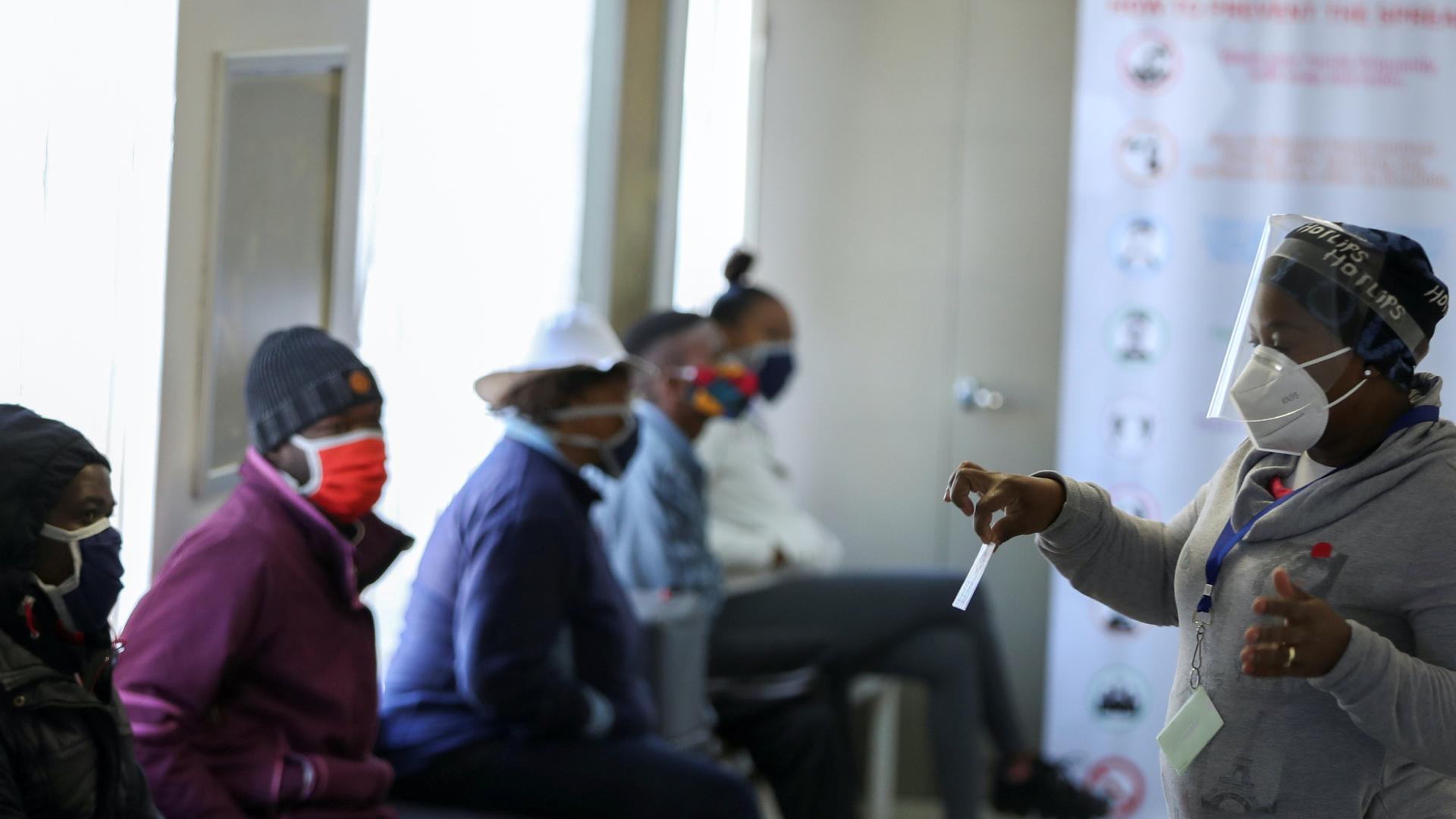A medical worker talks to volunteers as they wait to receive an injection during the country’s first human clinical trial for a potential vaccine against the novel coronavirus, at the Baragwanath hospital in Soweto, South Africa, June 24, 2020.
In June, South Africa launched a new COVID-19 vaccine clinical trial, the first in Africa.
The trial comes as South Africa is experiencing a surge in cases of the coronavirus after easing lockdown restrictions in late May, and currently accounts for a quarter of infections across the continent.
Related: Coronavirus lockdown: A tale of two South Africas
The vaccine, whose technical name is ChAdOx1 nCoV-19, was developed by Oxford University in England, where similar clinical trials began in April. It’s one of more than 140 new vaccines for the coronavirus being tested across six continents.
Nosisi Ngqiba, a 55-year-old resident of Soweto township in Johannesburg, is one of the 2,000 people expected to participate in the trial. Ngqiba believes she is helping her community — and her country — by participating in the trial, she said.
Last week, after receiving the injection, she was sent home with specific instructions to monitor symptoms.
“Every day, you take your temperature. You check your high blood. You check everything. So, that you can explain the side effects of the vaccine,” Ngqiba said, recounting what the medical officers told her.
“Sweating, shortness of breath, cough, loss of sense of taste, weakness, tiredness, headaches, joint pain, muscle pain,” she continued.
As of this weekend, Ngqiba hadn’t experienced any of the side effects.
“I don’t have any symptoms. I’m just fine,” she said.
While the UK trial has already advanced to later phases of the study and is now testing whether the vaccine works against COVID-19, this early phase in South Africa is looking at safety.
Related: Coronavirus vaccine trial showing promise
“From the time when they get exposed to the drug, on how they handle the drug, whether they do or do not have changes in their immune systems, in any other organ system for that matter.”
What is being looked at is “From the time when they get exposed to the drug, on how they handle the drug, whether they do or do not have changes in their immune systems, in any other organ system for that matter,” said professor Johnny Mahlangu, who heads the School of Pathology at the University of the Witwatersrand, Johannesburg, which is leading the trial.
Mahlangu also chairs the board of the South African Medical Research Council.
The same Oxford vaccine trial was recently launched in Brazil as well. The country currently has the second-highest number of COVID-19 cases and deaths in the world.
According to Mahlangu, it’s imperative to test the same vaccine in different parts of the world, especially in the Southern Hemisphere.
“With many of these studies. One might find either environmental differences or even genetic differences in the various populations in Africa,” he explained, noting that the coronavirus itself could also have regional variations.
Fittingly, the South Africa trial is tailored to the unique public health challenges of South Africa’s population and includes a cohort of participants who are HIV positive.
Related: The business of vaccines amid a pandemic
“That is a very important design,” Mahlangu said. “There’s a large number of patients who are currently either treated or walking around with HIV,” he continued.
Since the onset of the coronavirus pandemic, African leaders and scientists have been calling to be part of the research and production of the coronavirus vaccines.
Last week, the African Union held a two-day virtual conference on vaccine development in Africa.
“Africa cannot just be a passive participant. We need to be an active participant in both phase one, phase two, and phase three trials.”
“Africa cannot just be a passive participant. We need to be an active participant in both phase one, phase two, and phase three trials,” said John Nkengasong, director of the Africa Centers for Disease Control and Prevention during a press conference last week.
The simultaneous clinical trials of the Oxford vaccine allow researchers to observe a broad and diverse population of participants and gives South African researchers an opportunity to learn from the clinical trials in England.
Still, the South African trial is not without its risks.
“We are looking for potentially serious adverse events. And of course, mortality if there is any,” said Mahlangu, who notes, however, that the preliminary data suggests the vaccine is safe.
On Wednesday, “about 50 people held protests at the University of the Witwatersrand, … saying they did not want Africans to be used as guinea pigs, reflecting concerns among some on the continent over testing drugs on people who do not understand the risks,” according to Reuters.
But for Ngqiba, a mother of three and a grandmother of three, the risk of taking part in the clinical trial is worth it.
“Maybe by risking, I might help. Because this COVID-19 is killing. It was very hard to take this vaccine. But I tell myself: God give me strength,” Ngqiba said.
She recalled the sentiments of her children: “Mom, it seems you are going to help the South Africans. We are proud.”
Ngqiba will receive a second dose of the vaccine next month.
Our coverage reaches millions each week, but only a small fraction of listeners contribute to sustain our program. We still need 224 more people to donate $100 or $10/monthly to unlock our $67,000 match. Will you help us get there today?
